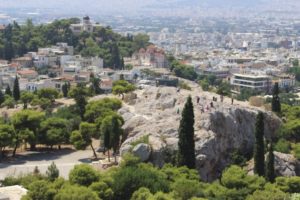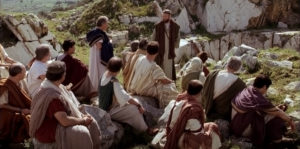
This week in Come Follow Me we get to read Acts 17. This chapter starts out with Paul and Silas making their way through Macedonia and Thrace, spreading the gospel and teaching the Saints. After Paul escapes the angry mob in Thessaloniki, he ends up in Athens, a city, “wholly given over to idolatry”. He goes to the Aeropagus, or Mars Hill, which is a place where people congregate to gossip and debate. While there he preaches the gospel.
Here are some of the highlights from my notes:
- Athens was the cultural center of the Greeks and world culture — it had some good ideas, but overall was not a good place.
- The Athenian philosophers viewed God as an abstract power, not a living being and as our Father. This is evident today in the concepts of the “Prosperity Gospel” that is so popular — this is the God of marigolds, as Elder Holland taught.
- They worshiped the creations of their own hands, rather than God. What things are distracting me from my religious focus and the Lord?
- They replaced revelation with reason, debate and their own ideas. There are so many people, groups, and movements in and out of the Church that are doing this right now. How do I protect myself from these things? How do I teach my children how to discern truth from error, right from wrong?
- They valued these things (their own ideas) over the truths of God.
- As they were wholly given over to idolatry, they were very superstitious. This superstition was their religion. They worshiped everything, so as to offend nothing. This is political correctness gone horribly awry — and is not much different than today. It is really important to learn how to not be offended.
- Aeropagus = Mars Hill. Rocky hill in the center of Athens. Directly to the south was the Acropolis which housed the temple of Athena, the patron saint of Athens, and Greek goddess of wisdom, courage, justice, law and war. She was venerated as the protector of the city of Athens. South of this was the temple of Dionysus, the Greek god of wine, merriment and theater.
- Paul is preaching in the heart of Athenian culture, with the most idolatrous and “Athenian” of the Athenians.

- These people are too superstitious — vs. 22
- They ignorantly worship the unknown God. Paul declares to them that the One True God is the unknown and only God. vs. 23
- The Lord created the world and everything in it. He does not dwell in these temples made by men’s hands, which are devoted to the idols of men’s hands. vs. 24-25.
- God made man, is aware of us, and is not respecter of persons. He appointed our lives. vs. 26
- Seek the Lord, he is not far from us. vs. 27
- Because we are the Children of God, in Him we live. vs. 28-29
- We are commanded to repent. vs 30.
- God the Father will judge us in righteousness because of Jesus Christ. vs. 31.
What was the reaction of the Athenians? Some mocked, and some believed. Paul experienced a similar condition on Mars Hill that we do today when we try to share the gospel. We are in a world that is so religiously checked out, and/or focused on the wrong things. I have really come to appreciate that the ancient saints faced many of the same trials as the modern saints, and I am trying to glean as much from them as I can. The worldly winds of change blow hard, hot, and quick. People of faith are pressured to accept the world and mocked or persecuted if we don’t fall in line. Who has been called a racist, a bigot, unloving, unkind for accepting the Lord’s standards? We will be swallowed up by the world if we are not careful So when we encounter people and endeavor to teach them, share with them, or defend our beliefs, we must teach them who God is first. Remembering we are children of God solves most of the problems we face. Forgetting this also leads us down bad paths. We also must be bold and unafraid like Paul as well, and unafraid to stand up, and speak out for what we know is right and true.
